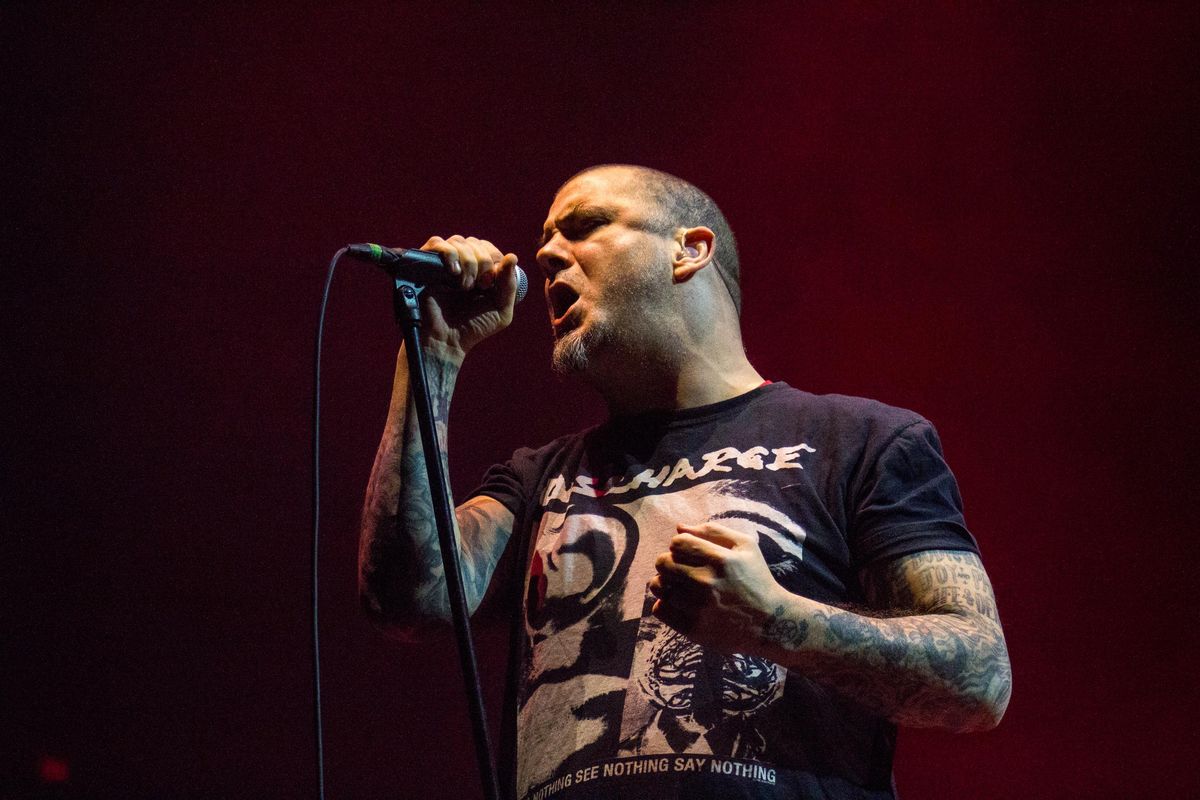‘I’ll miss you guys,’ Slayer frontman Tom Araya says in final concert at Spokane Arena

If Sunday night’s varied lineup of metal acts at Spokane Veterans Memorial Arena was a competition of attrition, precision and intensity, it would only be apt that departing thrash metal legends Slayer would lay claim to all of these top marks as “The Final Campaign,” the seventh and final leg of the band’s farewell tour, steamrolled into the Lilac City.
For 20 songs across two hours of music, Slayer maintained the breakneck pace that’s kept them crowned as the high priests of extreme thrash metal for more than 30 years. In their first show in Spokane since 2009, according to setlist.fm, Slayer hit the ground running with the uncompromising intensity of “Repentless” and continued through thrash staples “Angel of Death” and “Raining Blood.”
The setlist drew heavily from 1990’s “Seasons in the Abyss” and 1986’s “Reign in Blood,” both with four songs apiece contributing to the set. The band wore their late 50s age well as if it was just another thing that could be cured with enough sonic violence. Tom Araya’s rigid vocal delivery and steady bass playing remained strong, and the metronomic marvels of drummer Paul Bostaph was an accidental master class on how to control a mosh pit.
The twin-guitar attack of Gary Holt and Kerry King continued to provide the biting counterpoint and rich harmonies that have been imitated by everyone from Metallica to Avenged Sevenfold. The stage itself had fat Marshall amplifiers flanked by a dozen flamethrowers that made use of all of the production’s nightly allowance of 160 pounds of propane and 10 liters of 99% isopropyl alcohol.
This, combined with a series of neon-etched backdrops, made a captivating scene for the band to play around in the arena. Per metal precedent, there was no direct encore, but that doesn’t mean Slayer didn’t savor the moment. After the final song, the band and road crew returned to the stage for a photo with the crowd, with everyone slowly retreating backstage until Araya was the only one left standing.
“Thank you very, very much for so much. I’ll miss you guys,” said Araya before stepping off the stage in Spokane one final time. Here’s a rundown of the evening at the arena:
Philip H. Anselmo and the Illegals
While Philip H. Anselmo and the Illegals were tapped with opening duties, an already full arena floor argued against the absence that usually greets the first act.
Anselmo, of Pantera fame, fired off eight tunes from the Texas groove metal icons, which included the live rarity “Sandblasted Skin” and the anthemic “Walk.”
The dependable pulse of the set allowed incoming fans to get acquainted with the tone of the night and the mosh-pit regulars to get their stretches in for the long evening.
Anselmo’s barking vocals still carried their bite, while the Illegals did a fine job grappling the impossible task of replicating the Pantera rhythm section. All in all, the set was an adequate display of power.
Ministry
If there was anything that made Ministry’s first performance at Spokane Arena even more special, it was the hometown boy in their ranks.
Paul D’Amour, Spokane native and one-time bassist for Tool, spent his homecoming handling the low end for the industrial soundscapes of Ministry.
The same hands that once produced “Sober” for Tool had graduated to “One More Fix” for the industrial six-piece. A reeling jam on Black Sabbath’s “Supernaut,” complete with psychedelic backing videos and plenty of fuzz-encrusted guitar tones, made for an easy highlight of the eight-song set.
The status-quo destruction of “New World Order” and roar of “Jesus Built My Hotrod” were other highpoints that still fell short of saving the group from a comparatively unremarkable exit by frontman Al Jourgensen and company.
Primus
After entering the stage to an eerie orchestral arrangement that wouldn’t feel out of place in a Danny Elfman soundtrack, Primus wasted no time in reminding audiences of their experimental, virtuosic and utterly original sound.
The unconventional chemistry between Les Claypool’s bass figures and Larry LaLonde’s guitar lines have remained as unrivaled and unnerving, with Tim Alexander’s dynamic timekeeping stalling even the most intense moshers into awe.
The John Entwistle-esque bass runs in “Those Damned Blue-Collar Tweekers” and the percussive clank of “My Name Is Mud” were more than enough to distinguish the group to an audience with all of their eyes set on the legendary closer.